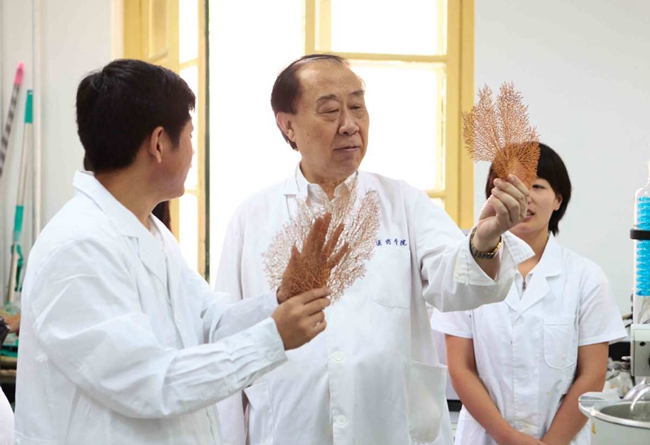Drug pioneer finds cures in ocean depths
By Xie Chuanjiao in Qingdao| (China Daily Global )| Updated : 2019-06-12
Print Print
Guan Huashi (center)
discusses the compounds of gorgonian, a type of soft coral, with colleagues at
Ocean University of China in Qingdao, Shandong province. CHINA DAILY
Eighty-year-old Guan Huashi is in constant pursuit of cures for human diseases, and his source is the ocean.
As one of the pioneers in marine pharmaceutical studies in China, Guan, a professor at Ocean University of China in Qingdao, Shandong province, had for the first time led a team that successfully developed the country's first marine drug, called PSS, in 1985.
The drug helps to treat cardiovascular diseases, those related to heart or blood vessels, and cerebrovascular diseases, which are those related to blood vessels supplying the brain.
The professor, also head of the Marine Biomedical Research Institute of Qingdao, steered an independent research team that is developing two drugs. The drugs, derived from marine organisms and designed to cure two forms of cancer, are expected to enter clinical trials this year.
The latest breakthrough of Guan and his team is an Alzheimer's drug called GV-971, which is extracted from brown algae. The first phase of clinical trials has been completed.
The drug is aimed at patients with mild to moderate Alzheimer's, a chronic neurodegenerative disease that usually starts slowly and gradually worsens over time, destroying thinking skills and the ability to carry out simple tasks. Independent animal experiments found that the drug can regulate the immune system, reduce neuroinflammation and improve cognition, according to a report by Xinhua News Agency.
"As a cradle of life, the ocean abounds in pharmacological potential," said Guan, also a member of the Chinese Academy of Engineering. "Products developed from marine sources can be of therapeutic value."
Guan's interest in marine pharmacology - a science that focuses on substances with active pharmacological properties present in marine species of plants and animals - was sparked by an unexpected discovery he made while conducting an experiment in a laboratory 40 years ago.
He found that a substance extracted from seaweed could help treat problems related to blood viscosity, which made him delve deeper into studying the potential of marine organisms in finding a cure for various human illnesses.
Guan majored in fisheries at the former Shandong Ocean College, the predecessor of Ocean University of China, from 1959 to 1964. After graduation, he was engaged in teaching and fishery research at his alma mater until the late 1970s.
During his childhood, Guan, who was born in Xiajin county in Shandong in 1939, loved to raise aquatic creatures such as fish, shrimps, crabs, turtles and tadpoles.
"Maybe my curiosity for creatures in water and my respect for rivers, lakes and seas when I was a child had some bearing on my career," said Guan, who spent a large part of his academic and professional life in Qingdao, a city known for marine technology.
When President Xi Jinping visited Qingdao in June last year, Guan told Xi about his dream to develop a "blue drugstore" for medicine in China, with blue implying the color of the sea. "We share the same dream," Xi said.
"Developing the marine economy and conducting research in marine sciences are important parts of the nation's strategy of rejuvenation," said Xi, adding that all-out efforts should be made in this direction.
According to Guan, the building of a "blue drugstore" would involve establishing a marine pharmaceutical database, setting up a public platform and applying the concepts of traditional Chinese medicine to modern medical science.
He plans to develop several new marine medicines in the next three to five years.
Guan's team has collaborated with dozens of research groups and more than 100 scientists from five countries.
In Guan's view, commercialization is a big step in turning his research findings into practical solutions. Therefore, he and his team maintain close ties with pharmaceutical companies.
In June last year, Guan's team signed an agreement with CP Pharmaceutical Group Qingdao for accelerating transformation of marine pharmaceutical research into commercial products.
In 1985, Guan's team joined hands with CP Pharmaceutical Group to develop the marine drug PSS.
Chen Yangsheng, the vice-president of CP Pharmaceutical Group Qingdao, said: "Currently, 13 marine drugs are on the market, recognized by medical and scientific communities worldwide. Three of these are manufactured by our company."
Qingdao is at the forefront of marine science and technology, said Wang Qingxian, secretary of the Qingdao committee of the Communist Party of China.
The coastal city is home to more than 30 percent of China's universities and research institutes in marine science and technology, as well as 50 percent of researchers and 70 percent of experts and scholars in the field.
"Qingdao is accelerating its efforts in high-quality marine sectors with a focus on economic transformation, efficient port service, opening-up process, technological innovation and ecological protection," Wang said.
